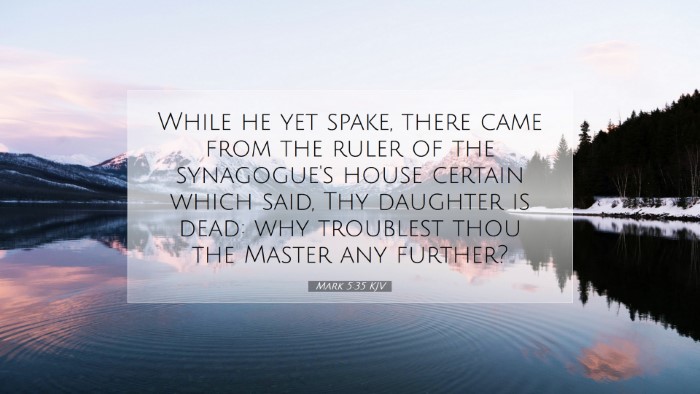Commentary on Mark 5:35
Mark 5:35 states: "While he yet spake, there came from the ruler of the synagogue's house certain which said, Thy daughter is dead: why troublest thou the Master any further?"
Contextual Analysis
This verse is situated within the narrative of Jesus’ miraculous works, specifically the account of the healing of a woman with an issue of blood and the resurrection of Jairus’ daughter. The timing and juxtaposition of events are vital for understanding the depth of the passage.
Commentary Insights
Matthew Henry's Commentary
Response to Suffering: Henry highlights the despair that comes with the news of death, particularly for Jairus, who was filled with hope just moments before. He indicates that the arrival of the messengers signifies a turning point in Jairus' journey from expectation to despair.
Teachings on Faith: Henry underscores the importance of faith amid overwhelming circumstances. He emphasizes that Jesus’ presence provides comfort, and His timing is essential to the unfolding of God’s purposes.
Albert Barnes' Notes
Communication of Tragedy: Barnes analyzes the nature of the messages delivered to Jairus. The informants come with the stark and hopeless news: "Thy daughter is dead." Barnes posits that this statement reflects the finality of death and the perceived futility of seeking further help.
Jesus as the Solution: He notes that the timing of this news coincides with Jesus’ teaching about faith. Barnes argues that this moment serves as a crucial test of Jairus' faith as he confronts loss, and the discouragement posed by the messengers challenges his hope in Christ’s power.
Adam Clarke's Commentary
Understanding Grief: Clarke provides an insightful perspective on the emotional state of Jairus. He acknowledges that the news delivered to him was a natural cause for sorrow and doubt, highlighting the human experience of grief when confronting death.
The Role of Jesus: Clarke emphasizes how the interruption of Jairus' journey by the woman who touched Jesus' garment illustrates divine timing and the nature of faith. He insists that Jesus, undeterred by worldly circumstances or news, is always capable of working miracles, calling for undaunted faith amidst adverse reports.
Theological Implications
This verse reflects several theological themes:
- The Sovereignty of God: The message brought to Jairus about his daughter underscores God's control over life and death.
- Faith in Crisis: The importance of maintaining faith despite dire circumstances is a recurring theme in scripture, encouraging believers to trust in God’s plans.
- Hope in Despair: Jesus' subsequent instruction to Jairus points towards a future hope beyond human understanding and expectation, illustrating His authority and compassion.
Practical Reflections
For pastors, students, theologians, and Bible scholars, Mark 5:35 presents a crucial insight into the nature of faith and the immediacy of divine help:
- Hope in Despair: Encourage congregants to see beyond their immediate trials, reminding them that Christ is always at work in their lives.
- Emphasis on Prayer: The narrative encourages the faithful to bring their needs directly to Jesus, who listens and responds with love and power.
- Education on Faith: Utilize Jairus' story to teach that faith is not diminished by circumstances but rather illuminated when faced with obstacles.
Conclusion
Mark 5:35 serves as a poignant reminder of the deadening weight of despair juxtaposed with the invigorating call to faith. The commentaries of Matthew Henry, Albert Barnes, and Adam Clarke elucidate the dynamic interplay between hope and hopelessness, guiding ministers, students, and scholars in understanding the profound depth of the Gospel. This passage not only reinforces the necessity of faith in the face of unimaginable circumstances but also highlights the ever-present possibility of divine intervention.


